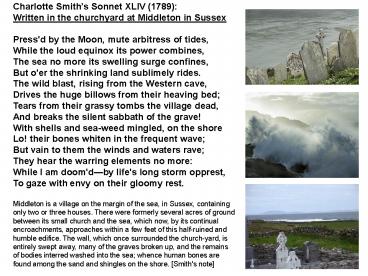Charlotte Smiths Sonnet XLIV 1789: - PowerPoint PPT Presentation
1 / 10
Title:
Charlotte Smiths Sonnet XLIV 1789:
Description:
Charlotte Smith's Sonnet XLIV (1789): Written in the churchyard at ... With hoarse, half-utter'd lamentation, lies. Murmuring responses to the dashing surf? ... – PowerPoint PPT presentation
Number of Views:368
Avg rating:3.0/5.0
Title: Charlotte Smiths Sonnet XLIV 1789:
1
Charlotte Smiths Sonnet XLIV (1789) Written in
the churchyard at Middleton in Sussex Press'd
by the Moon, mute arbitress of tides, While the
loud equinox its power combines, The sea no more
its swelling surge confines, But o'er the
shrinking land sublimely rides. The wild blast,
rising from the Western cave, Drives
the huge billows from their heaving bed Tears
from their grassy tombs the village dead, And
breaks the silent sabbath of the grave! With
shells and sea-weed mingled, on the shore Lo!
their bones whiten in the frequent wave
But vain to them the winds and waters rave
They hear the warring elements no more While I
am doom'dby life's long storm opprest, To gaze
with envy on their gloomy rest. Middleton is a
village on the margin of the sea, in Sussex,
containing only two or three houses. There were
formerly several acres of ground between its
small church and the sea, which now, by its
continual encroachments, approaches within a few
feet of this half-ruined and humble edifice. The
wall, which once surrounded the church-yard, is
entirely swept away, many of the graves broken
up, and the remains of bodies interred washed
into the sea whence human bones are found among
the sand and shingles on the shore. Smith's
note
2
The sea no more its swelling surge confines, But
o'er the shrinking land sublimely rides.
3
Liminal Scenes and States
- The word liminal relates to many interests
associated with Romanticism. - Liminal (adj.)
- Relating to a transitional stage or
- occupying a position on or at both
- sides of a boundary.
- At the brink, at the edge, at the thresholdor
going beyond, crossing over, transgressing,
glimpsing at the other side. - Sublime awesome, uplifting.
- As if at a height of being, beyond which one can
hardly imagine. - Limit a boundary.
- Limbo caught between two states.
- Subliminal beneath a threshold.
4
Liminal (adj.) Relating to a transitional
stage or occupying a position on or at both
sides of a boundary.
Liminal Scenes and States
- Settings
- Edge of the sea
- Mountains and cliffs
- Beyond familiar terrain
- States of Being
- Childhood, from innocence to experience.
- Life and death, an interest in death in life.
- The supernatural (mystery magic).
- Outcasts the poor, vagrants, wanderers.
- Mental states psychological extremes
- Going from present to past by means of memory and
reflection. - Interest in dreams and nightmares.
- Interest in drug use (opium).
- Interest in madness.
5
Monk by the Sea, Caspar David Friedrich (1809)
6
Seashore by Moonlight, David Caspar Friedrich
(1834-5)
7
(No Transcript)
8
A defiant attitude toward limits
- A salient trait of Romanticism is a defiant
attitude toward limits (NA 15). - The Romantic period, the epoch of free
enterprise, imperial expansion, and boundless
revolutionary hope, was also an epoch of
individualism in which philosophers and poets
alike put an extraordinarily high estimate on
human potentialities and powers (NA 15). - In representing this expanded scope for
individual initiative, much poetry of the period
redefined heroism and made a ceaseless striving
for the unattainable its crucial element (NA
15). - Viewed by moralists of previous ages as sin or
lamentable error, longings that can never be
satisfiedin Percy Shelleys phrase, the desire
of a moth for a starcame to be revalued as the
glory of human nature (NA 15). - The restrained and polished quality of Popes
poetic versecompressed and confined in its neat
package of heroic coupletssuggests a notable
contrast with the ideals associated with
Romanticism.
9
- The Bard,
- John Martin,
- 1817
10
Manfred on the Jungfrau, John Martin, 1837































